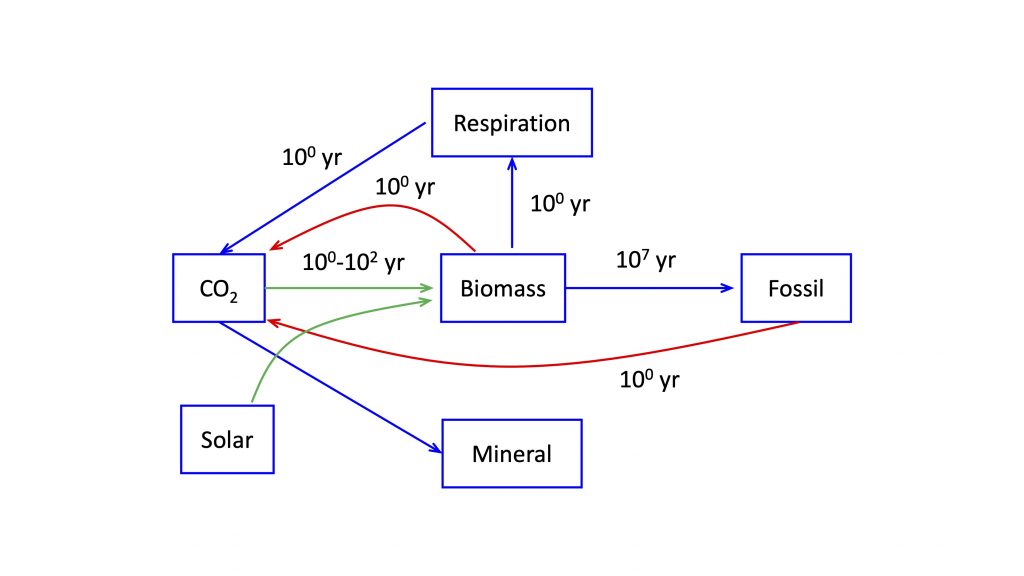What piqued my interest: “Climate change is caused by bringing up stored carbon from underground. That’s what a fossil fuel is. Burning trees, which we also do in campfires and our fireplaces, is not as bad as burning coal.” [emphasis added] @leahstokes
My replies
- Not sure that’s right — no time to research, but see here “When burned, trees generate more CO2 emissions per unit of energy generated than fossil fuels.” + loss of carbon sequestration.”
- I’m curious. Please share research citations. “Because combustion and processing efficiencies for wood are less than coal, the immediate impact of substituting wood for coal is an increase in atmospheric CO2 relative to coal.” https://iopscience.iop.org/article/10.1088/1748-9326/aaa512
- New formulation of (academic) question: If there are 2 power plants, one using fossil fuel and the other wood (biomass), under what circumstances, if ever, does it make sense to substitute fossil fuel for biomass? (I can’t find @leahstokes original tweet …).
Science-based reply that make sense to me:
“I try to look at this problem in terms of fluxes in the carbon cycle. I made a schematic of a simplified carbon cycle (attached) and then read the article you sent. Mine is a much simplified version of their Figure 1. Before the industrial revolution there was a near-steady state of exchanges among the carbon reservoirs. Burning carbon fuels leads to a massive disruption of that steady state – fossil energy is produced extremely slowly (low power) and consumed very rapidly (high power). Given the fluxes involved, we (nor even your (great)n-grandchildren) will see that steady state restored.
So should we replace fossil fuels with biomass? I think it depends on the type of biomass. Wood is problematic for the reasons discussed in the article you linked to. The production-vs-consumption powers do not have as large a disparity as with fossil fuels, but it is still there. Trees take 50-100 years to restore, so in the short term, you have a CO2 increase. But that “short term” is pretty long given that the problem started 200-250 years ago, and really accelerated within the last 100 yrs.
To get to a viable steady state, you need to produce energy at a rate comparable to that which it is consumed. Solar electric and wind do this (although there is a hefty CO2 price tag for production of these resources). For biomass, that means something that can be grown, harvested, and converted to fuel on a 1-yr timescale. There are enzymes that convert cellulose and lignin into soluble organic molecules that could be feedstocks for the energy and chemical industries. We actually are studying some of those enzyme mechanisms, so I probably have a bias here.
Additional improvements could come from using technologies that are more efficient than combustion to produce heat to spin turbines to make electricity. Direct organic fuel cells, for example, would be great, but are only expensive laboratory curiosities. – Anon
Footnote: “You can use the text and graphic, but please don’t use my name. I wrote most of this off the top of my head, without the usual research that I apply to something that I put my name on. Also, my name and email address are readily available on the internet, and I don’t want to be deluged with messages from opponents (or supporters for that matter).”

Another science-based reply that make sense to me:
- I was snotty yesterday, sorry. The key word your quote is ‘immediate’. That calculation neglects the carbon removed from the atmosphere by the trees that grow up to replace the ones you are burning. 1/2 So the real question is, compare a 50 year old stand of trees’ rate of carbon accumulation with the rate of accumulation in a recently cut and replanted stand. Latter is certainly higher, but you probably have to burn some gasoline to harvest and replant…2/2 Daniel Kirk-Davidoff@dankd
Replies that make little sense to me:
- Well, I did have about 15 years to research it. And yes, my facts on how the carbon cycle works are correct.
- Dude, @leahstokes has a whole book on these subjects.
- That’s fair, which is why one should start by reading a book written by an expert like Leah instead of asking her to reproduce her scholarship on Twitter.
- You wasted 15 years if you think using trees for energy is in any way whatsoever good clean & renewable energy. As per…ignoring overpopulation just makes you truly ignorant of the real issues causing climate change.
Quick (Incomplete) References